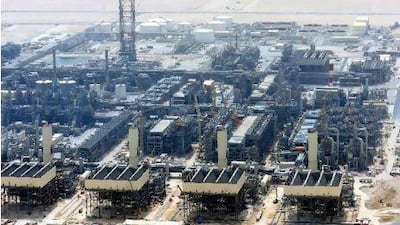It used enough steel to build an Eiffel Tower every 12 days, 52,000 people worked on it, and it cost almost US$20 billion (Dh73.46bn).
Royal Dutch Shell's Pearl gas-to-liquids plant at Ras Laffan in Qatar delivered its first cargo of synthetic fuels on June 13, and at full capacity, it will yield a quarter of Qatar's entire oil output.
Halfway around the world another enormous project is taking shape, Shell has just committed to building a floating liquefied natural gas (LNG) plant at its Prelude field off Western Australia. The plant, which will super-cool gas so it can be delivered worldwide by tanker, will be the largest floating structure ever built, six times as large as a Nimitz-class aircraft carrier.
Floating liquefaction plants can be used to develop smaller or more remote fields where a land-based facility would be too expensive. They reduce environmental impact and disputes over land rights that hamper some projects in Australia. And, once the inevitable teething troubles have been dealt with, they should be cheaper and more flexible than the custom-built onshore facilities.
There are numerous gasfields, some long-untapped, in Australia, Nigeria, Brazil, East Africa, Iraq and elsewhere, which could finally be developed with floating plants.
The third component of this gas revolution is less immense but equally important. Floating LNG receiving terminals, which turn the liquefied cargoes back into gas for consumers to use, can be installed in months. Terminals in Dubai and Kuwait started up last year, and their use is spreading through the world.
Smaller, isolated markets, particularly islands such as Cyprus, Jamaica and Java, could not afford full-scale onshore terminals. Some countries are not sure about the quantity and timing of LNG they require. For both scenarios, a floating terminal, which can simply up anchors and move to a new destination, is ideal.
Furthermore floating terminals avoid many of the environmental objections that have scuppered numerous onshore receiving terminals from California to Italy.
These three innovations will support the transformation of the gas business over the next two decades, as it continues its advance to being the fossil fuel of the future. One of them, though, may not achieve its promise.
Three factors are driving these innovations.
First, gas is suddenly in abundance, because of the rapid development of Qatar's North Field, new projects on the horizon in Australia and, above all, the tidal wave of gas being produced from shales. With Prelude and projects like it, Australia could overtake Qatar as the world's largest LNG exporter before 2020.
Second, oil prices remain high, driven by Opec restraint, the uprisings across the Middle East and North Africa and continuing strong Chinese demand. As a result, in the US, oil is more than four times as costly as the same energy from gas; even in Europe and Asia, the gap is two-to-one.
Though Pearl loses a third of the energy in the gas in the conversion process, its vast costs should be paid off within five years.
Third, gas-fired power stations are cleaner and quicker to build than coal, simpler and less controversial than nuclear power plants, and cheaper and more reliable than renewable power such as wind and solar. Gas is the fuel of choice for new electricity generation - and is ideal for backing-up variable renewable energy.
Gas is increasingly replacing oil for electricity and heating, and may enter transport markets too. Some shipowners, bound by stricter rules on polluting fuel oil, are considering LNG, and gas could increasingly feature as a fuel for taxis, buses and trucks, as in Egypt, India and Malaysia.
As more LNG producers and more customers enter the fray, the market becomes increasingly flexible and liquid. This is essential to ensure that prices do not diverge too widely between regions, and that buyers are not dependent on a single supplier.
The role of floating LNG terminals seems assured. Because of them, all can share in the era of cheap gas, which has emphatically returned.
The future of gas-to-liquids is less certain.
The question still remains whether Pearl, which ran far over its original $4.5bn budget will be the flagship of a new era or resemble the Space Shuttle, a marvellous but ultimately dead-end piece of technology.
The South African gas-to-liquids specialist Sasol's much smaller Oryx plant in Qatar suffered long delays during start-up, ExxonMobil cancelled its own plans for another giant Qatari gas-to-liquids facility, and a third plant in Nigeria has been repeatedly postponed.
The question is which approach will win - turning gas into transport fuels, or using it directly in vehicles?
Gas-to-liquids can still progress beyond Pearl. Sasol is now looking into converting Canadian shale gas into synthetic oil. Bridging the gap between oil and gas would help take the pressure off oil supplies and give Opec countries one more factor to worry about.
New technologies are always prone to delays and budget overruns. Shell has been working hard on Pearl and floating LNG since the early 2000s. But the long-awaited arrival of these massive facilities heralds a cleaner, cheaper and more flexible global energy system.
Robin Mills is an energy economist based in Dubai, and author of The Myth of the Oil Crisis and Capturing Carbon


